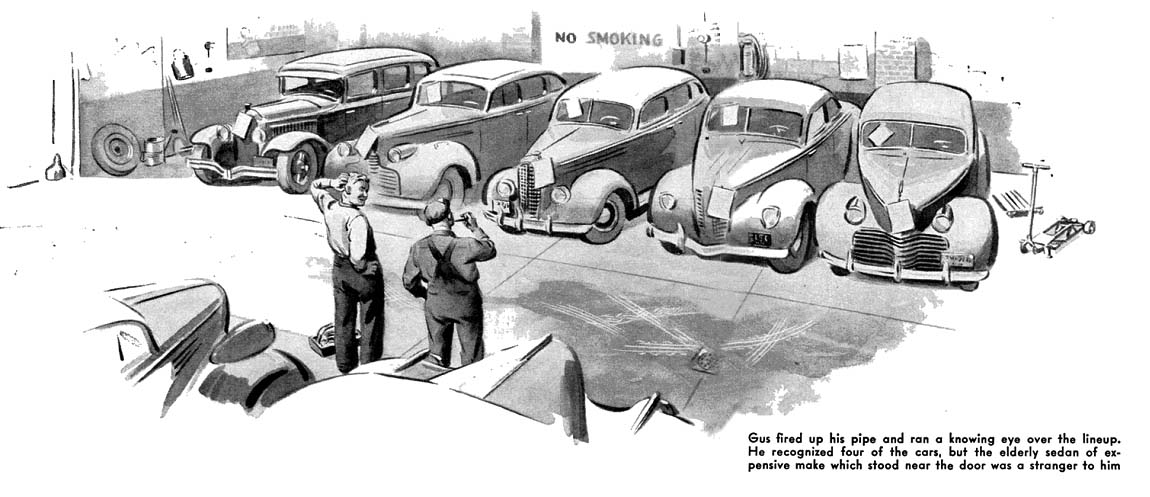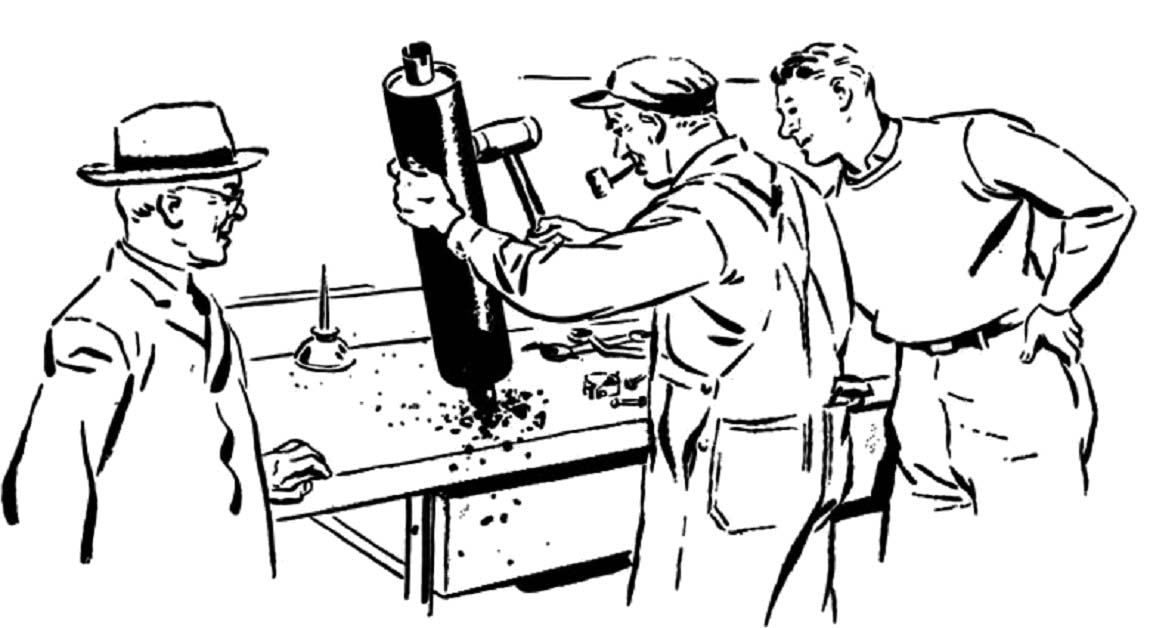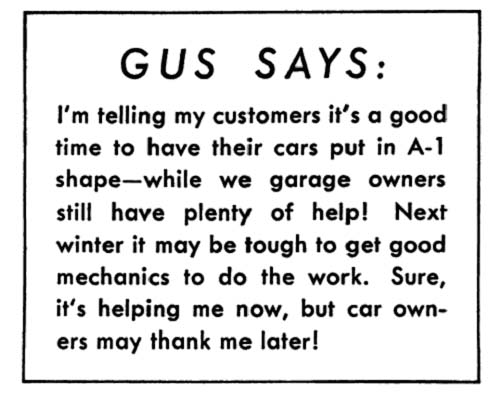October 1941
GUS CLEARS THE WAY
by Martin Bunn
Take it from the Wizard of the Model Garage:
Just because your muffler is uncomplaining, don't assume that it's healthy.
It may be just suffering in silence!
When Gus Wilson got back to the Model Garage after an errand down in the city one day last week, he found Bill, the mechanic, standing still in the middle of the shop floor, scratching his head as he stared at five cars lined up along the far wall. When he saw Gus he grinned. "Too much business, Boss," he said. "They all came in within the last half hour, and I'm darned if I know which one to start on."
Gus fired up his pipe and ran a knowing eye over the lineup. He recognized four of the cars, but the elderly sedan of an expensive make which stood near the door was a stranger to him. "What' the matter with 'em?" he asked.
"Brakes need adjusting on the Miller job," Bill told him. "Say, that dame drives a car like she was ridin' a bronc' in a rodeo, don't she? Lighting-system check-up on Mr. Knowles's car -- he says his head-lights black out every time he steps on the dimmer button. Engine won't idle right on Hubbard's bus. That coupe of Dave Sledd's is using a lot too much oil -- it might be a bad gasket, hey? I guess maybe I can take care of all of 'em, once I've decided where to make a start."
Gus nodded. "What about the other one?" he asked. Who brought that in?"
"Feller I don't know, but he asked for you," Bill said. "He's in talking to Mr. Clark now."
Gus went into Joe Clark's office and found him in conversation with a scholarly looking middle-aged man who was perched comfortably on the corner of a desk. "Here he is now," Joe said when he saw his partner.
The visitor got off the desk and extended his hand. "My name's Folsom," he said.
"Young Dick Coleman is in one of my classes at M.I.T. I was driving through town, and dropped off to say hello to him. I have been having trouble with my car for the last few hundred miles, and when I told him about it he suggested that I come in and see you. It's an old car, but it was a good one, and I never had any real trouble with it until yesterday afternoon. I've had it in three garages along the road, but none of them did it any good. Dick says that you are a champion trouble-shooter, so I thought . . ."
"Dick meant well," Gus said, "but he's put me on a spot. I can imagine myself taking an automotive problem to an M.I.T. professor, but I can't imagine myself solving one for him!"
Folsom laughed. "Possibly that would apply to some of our faculty men, but it doesn't apply to me," he disclaimed. "my subject is mathematics, and I don't know any more than the average car owner -- perhaps I know less -- about what goes on under the hood. As I was saying, in the three years I've been driving this particular car I've never had any serious trouble until yesterday. Then, without any warning, something happened which keeps it from going over 28 miles an hour. It's just as if there were a governor on the engine."
"Any unusual noise?" Gus wanted to know.
"Yes, there is," Folsom told him. "There's a queer sort of roaring sound that I've never heard before. But I haven't been able to locate its source."
"I'd better take a little ride," Gus decided. "Want to come?"
Folsom said he did. With Gus driving, they set off down the road. The car ran smooth as cream at 25 miles an hour. Then Gus pressed gently down on the accelerator pedal and watched the speedometer hand. It went up to the 28-mile notch -- and it didn't go any farther. "By George," Gus said "this is a queer one. You're dead right. The engine acts as if it had a governor on it. Feels queer too, as if something were holding the car back."
"Hear that noise?" Folsom asked.
Gus nodded. From somewhere under them came a dull roaring sound.
Gus turned the car and drove back to the shop. He got out, leaving the engine running. As he was about to raise the hood Joe Clark stuck his head in at the office door and called that he was wanted on the telephone. "I'll only be a minute," he told Folsom.
When he came back in the shop after answering the 'phone, Gus saw that Folsom still was sitting in the car, and heard that the engine still was running. As he passed the rear end his quick ear caught a faint whistling noise. He cocked his head and listened. It seemed to come from the exhaust pipe.
He held the palm of his hand an inch from the end of the tail pipe. The exhaust seemed normal. But Gus had an idea.
"Step on her, please," he called to Folsom. The engine picked up speed quickly -- and then didn't pick up any more speed.
The whistling sound grew louder and then deepened into the dull roar they had heard on the road. "Step on her harder," he called to Folsom.
Again Gus held his opened hand close to the end of the tail pipe. This time he didn't feel anything. There was no exhaust!
"Switch her off," he called. "I've got it -- although I'm darned if I know just what it is that I've got. There is normal exhaust when your engine is idling, but none at all when you speed it up. What sort of condition is your muffler in, Mr. Folsom?"
Folsom had cut the engine and had come around to the back of the car. "Muffler?" he repeated. Why, I've never had any trouble with it. And, now that you mention it, I've never paid the slightest attention to it."
"Very few drivers ever do," Gus said. "And right there is where they make a big mistake. A car needs exhaust service just as much as it needs any other kind of service. As a matter of fact, the exhaust system deteriorates faster than almost any other part of a car. Most jobs need new mufflers after they've been driven twenty or thirty thousand miles. Why, more than half of the cars that come into this shop need exhaust service -- they have dented or leaky or clogged mufflers, or their tail pipes are badly dented or pretty well rusted out, or they have leaky exhaust gaskets. But if you say anything about exhaust service to the average car owner he gets suspicious that you're trying to run up a bill on him. 'Oh,' he says, 'you mean the muffler. Let it go. It'll do all right for a while yet.'
"Hey, Bill! Help me get the muffler and exhaust pipe off Mr. Folsom's car, will you?" They took the muffler off, and Gus examined it carefully. "Doesn't look too good -- rusted almost through." He got a small mallet from his workbench and tapped the muffler gently with it. Black soot came trickling out.
"Pretty dirty," Folsom observed. "So that is what has been causing all my trouble."
Gus shook his head. "No, it can't be that," he said.
"It's dirty, but it isn't entirely clogged up. It isn't so simple as that."
He started to disassemble the muffler.
"Hello!" he said. "Here's a baffle plate that's come loose. Let's see, now -- by gum, that's it! See what has been happening?"
Folsom examined the muffler and the loose baffle plate. Then he shook his head. "No, I can't say that I do." He admitted.
"Look here," Gus said. He demonstrated as he talked. "While your engine is idling or running at low speed the pressure of the exhaust doesn't amount to much, and this loose baffle plate doesn't do any harm, although the exhaust getting around it makes that whistling sound I spotted when I walked past the rear end of your car while your engine was idling. But when you speed up your engine of course the pressure of the exhaust increases, and when you get up to 28 miles an hour it gets strong enough to press the loose plate against the rear end of the muffler, and hold it over the opening through which the exhaust should escape into the tail pipe. The burned gases which can't get out of the muffler build up a back pressure which acts as a governor on your engine. When you slow down the engine the exhaust pressure eases so that the loose plate isn't held against the end of the muffler and the burned gases can again get around it."
Gus re-examined the muffler. "No use in trying to fix this," he decided. "It's too near done for to make it worth your while. What you need is a new muffler."
"Put it on, please," Folsom said. "And next time you're up Boston way drop in at M.I.T. and give us a lecture on expert automotive trouble-shooting!"
After Folsom had driven away Bill came over to the workbench where Gus was cutting a gasket. "Say, boss," he said, "what's all that stuff I heard you telling that feller about exhaust service? I've cleaned out my share of clogged mufflers in my time, but I never heard anyone call it exhaust service."
"What I call exhaust service," Gus told him, "is a lot more than just cleaning out a dirty muffler after it has become so clogged that even a dumb driver realizes that there's something wrong with his car. The time to clean out an exhaust system -- and, if it needs it, to repair or replace some of its parts -- is before it causes any trouble."
Bill still seemed doubtful. "Look at it this way," Gus said. "After a charge of gas and air has done its job of driving down a piston, the burned gases have to go somewhere don't they? What I call exhaust service clears the way for those burned gases to get out into the open air -- with the least possible resistance -- where they can't do any harm."
"All right," Bill gave in, "you've converted me. But unless a muffler is so nearly clogged up that there isn't any exhaust coming through it, how can you tell whether there is anything wrong with the exhaust system?"
Gus got off the bench. "I'll show you how," he said. He walked over to a car and examined its muffler. "This looks O.K.," he said. "Now I'll show you how to find out whether it is O.K. Just raise the car about two feet on the hoist, will you?"
He went over to his workbench, and in a few minutes came back with a length of small rubber hose over his arm and a tapered wood plug in one hand and a can of light oil in the other. He tried the plug in the tail pipe and found that it fitted snugly. Then he showed Bill that it had a V-shaped cut a half inch deep extending its full depth. Going around the front end of the car he disconnected the windshield wiper and then attached one end of a rubber tube to the intake manifold and dropped the other end in the can of oil.
"Start her up," he told Bill, "and then come down here with me."
Bill did as he was told. After a few seconds smoke began to float out from under the car's body. They got down on the floor to see where it was coming from. "It's the flange connection between the exhaust manifold and the exhaust pipe," Gus said.
"Probably just needs tightening . . . That's a sure-fire check, Bill. If there is no smoke, the exhaust system is O.K. If there is smoke, you know that the part of the exhaust system it is coming from has gone bad."
"You've got something there," Bill said.
"Say, maybe most of the cars that come in here should get that test."
"No 'maybe' about it," Gus told him. "I haven't any doubt that more than half of them need exhaust service. But I've never had much luck in convincing car owners that keeping the way clear for the exhaust to get out is important. Perhaps you'll have better luck. If you do, you'll save some of our customers both grief and money."
END
L. Osbone 2019



